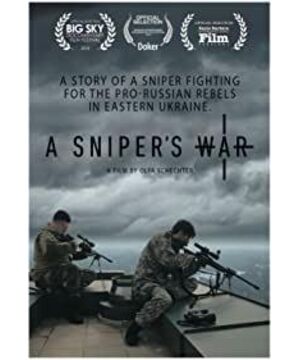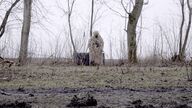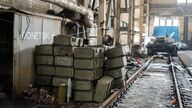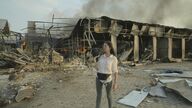Last year, the little-known Arizona Independent Film Festival's Best Foreign Language Documentary Award was awarded to the little-known director Olya Schechter's "Sniper's War". This documentary interviewed an international volunteer sniper, Serb Deki, who fought for pro-Russian rebels in the Donbass region of Ukraine, and recorded his combat life.
The director explained her original intention to make this seemingly irrational documentary: "Making this film challenges objectivity. In Donetsk, it feels like walking through a mirror. On the opposite side of the mirror, faith and the United States It’s very different. The most important thing is to be impartial and politically neutral, and tell the story through Deki’s point of view."
First of all, what is the background of this war? One month after the Crimean conflict in 2014, a rebellion broke out in eastern Ukraine, splitting the Donetsk People’s Republic. The Ukrainian army is supported by NATO, and the Donetsk People’s Republic militia/pro-Russian rebels are supported by Russia. The two sides have been fighting for several years.
Numerous international volunteers joined the war without payment, voluntarily wandering in the muddy waters. Deki is one of them.
In the interview segment in the documentary, the director asked Deki why he was here. This is not your war. And Deki replied: No, this is also his war. NATO destroyed his homeland of Yugoslavia and shelled Serbia, killing countless civilians. At that time Russia provided help to Serbia. Now that the war in eastern Ukraine broke out, his comrades in arms summoned him to join him. He thought it was time to repay the help he received. More importantly, he believes that this is fighting for his own beliefs to protect civilians in Donetsk, and that his opponent is still the hated NATO. He believes that NATO's trampling of international law is the biggest genocide machine. NATO only serves the power, regardless of the life and death of civilians.
Before participating in this war, Deki himself was also a civilian. He was an ordinary construction worker and participated in the construction of the stadium for the Sochi Games. His ordinary dream is to make money, buy a small house, and retire. But now, he returned to the battlefield, picked up the sniper rifle again, and didn't know when he would return to ordinary life. He wanted to leave a long time ago, but was challenged by a Ukrainian sniper. He accepted the challenge and killed the opponent. But now he can't go back to Serbia, because a new bill was established there, and those who participated in the Donetsk war returned to the parliament and were locked up.
Deki said that there is only a line between the soldier and the killer, so be careful not to cross the boundary. He reminded himself to keep his original intentions, protect civilians, and only get rid of opposing soldiers who have weapons. Through the lens, there is fatigue beneath his calm surface.
Maintaining political neutrality is a very difficult task. Choosing the perspective of a foreign volunteer for the documentary is a good start.
However, since 2014, the Western media have always favored Ukraine. The Donetsk War of Independence vs. Russia's invasion of Ukraine, which topic is more full of information sources. As for Ukraine, nationals who have always gone to extremes of nationalism naturally do not accept the term "pro-Russian rebellion", and it is generally believed that the regular Russian army disguised themselves as Donetsk militias to invade Ukraine.
Fifty cents is not a special product of the celestial dynasty, and it is also found in Ukraine. The IMDb website is full of "film reviews" with only the title "Russian political propaganda junk" and one-star bad reviews. On the contrary, it can be seen how deeply popular political propaganda and nationalism are in Ukraine. They chose to believe what was carefully induced to believe, and they chose to be blinded by the encounters of civilians in the east. The documentary brought the grief of the civilians in the cemetery with a calm style: the old woman looked around and said blankly: "It's really scary."
Recommend a few movies suitable for watching with this documentary.
View more about A Sniper's War reviews






